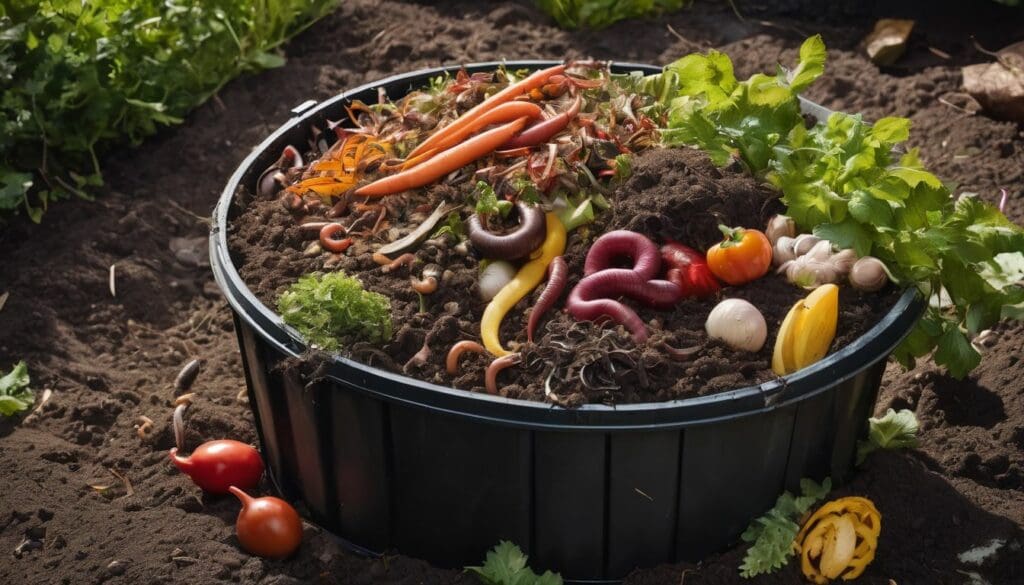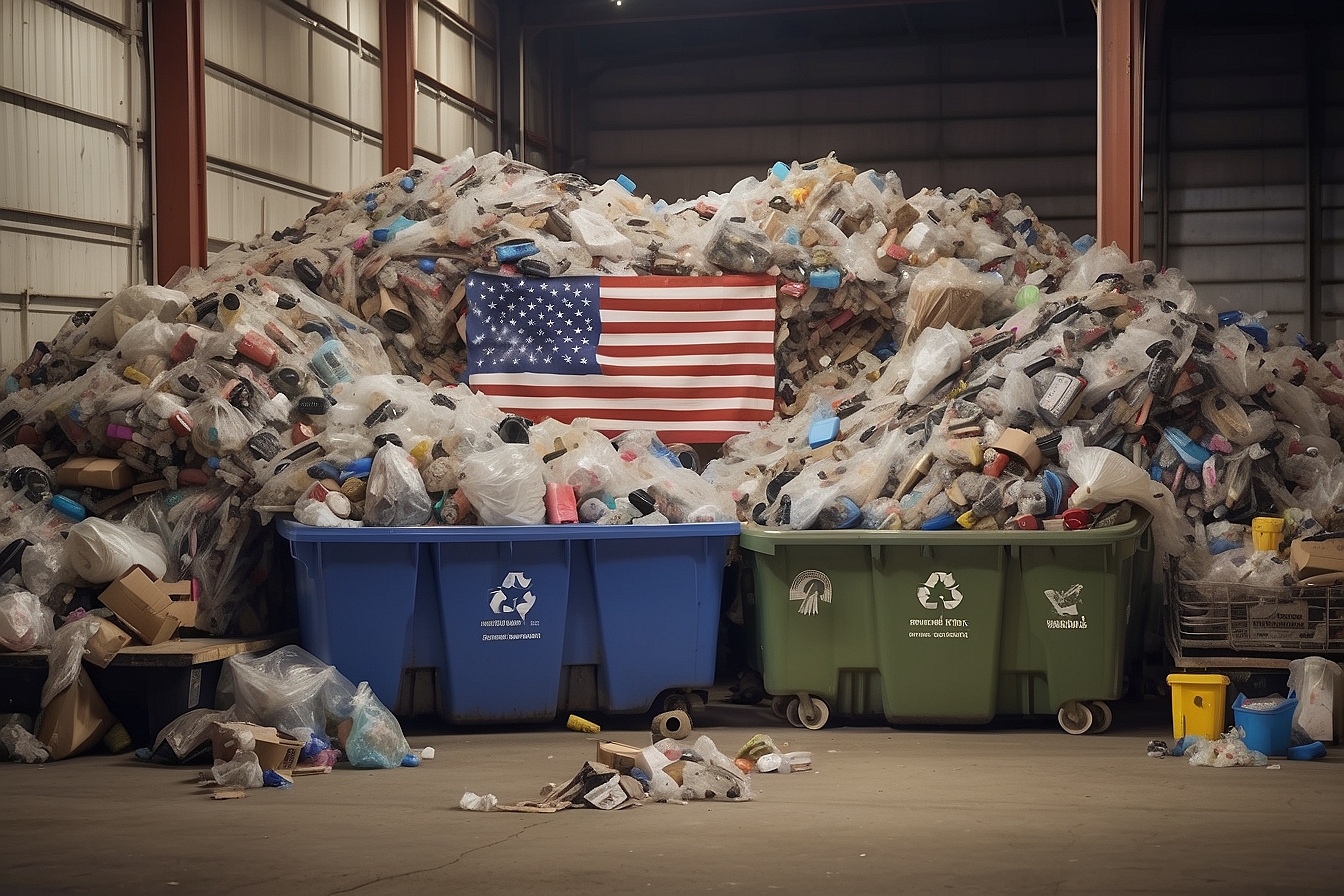Do you ever catch yourself gazing at the ever-growing stack of vegetable peelings and apple cores, a twinge of guilt washing over for contributing to the quite startling statistic that over a third of food produced worldwide is squandered? You’re certainly not alone in this.
It’s something many of us feel troubled by. But there’s hope yet—in the form of home composting—a craft as old as time, where perceived ‘rubbish’ is reimagined into nourishing soil.
And truly, it’s far simpler than one might assume. Allow us to take you through an uncomplicated guide where your discarded peelings can bloom into nutrients fit for a king’s garden!
Key Takeaways
- Composting reduces household waste significantly, preventing the accumulation of biodegradable materials in landfills and promoting sustainable living.
- Making compost at home improves soil health by adding vital nutrients back into the earth, thus fostering robust plant growth and enhancing garden biodiversity.
- Home composting can lead to significant cost savings as it lessens the need for shop-bought fertilisers and soil conditioners while reducing expenses on waste disposal services.
- By engaging in home composting practices, we actively lower greenhouse gas emissions since organic waste decomposes without releasing methane gas that would otherwise occur in landfills.
- The article offers practical guidance on choosing a suitable compost bin, identifying appropriate materials for composting, understanding the breakdown process, and presents different methods like vermicomposting for different living situations.
The Benefits of Composting at Home
Composting at home has numerous benefits, including reducing waste, improving soil health, saving money, and reducing greenhouse gas emissions. It’s a simple yet effective way to turn kitchen scraps and garden waste into nutrient-rich compost for your plants.
Reducing waste
We can make a huge dent in the amount of rubbish we send to landfills by composting at home. Kitchen scraps, garden trimmings, and other biodegradable materials can transform into nutrient-rich compost instead of clogging up waste disposal sites.
This process not only recycles organic waste but also helps us live more sustainably.
By turning food waste into soil enrichment, our gardens reap the benefits without contributing to the mounting problem of environmental pollution. We encourage biodiversity as well, since compost acts as a natural habitat for beneficial organisms.
Each handful of garden gold that we sprinkle around plants symbolises our commitment to reducing our ecological footprint and promoting environmental conservation.
Improving soil health
Improving soil health is a key benefit of composting at home. When organic waste decomposes, it creates a nutrient-rich compost that enhances the soil’s fertility and structure. This results in healthier plants, better water retention, and improved resistance to pests and diseases.
Additionally, using compost in your garden or yard helps sequester carbon from the atmosphere, contributing to greenhouse gas reduction while creating a sustainable cycle of nutrient recycling.
By enriching the soil with homemade compost, we can reduce our reliance on chemical fertilisers and promote environmentally sustainable practices. Nutrient-rich compost acts as an organic soil amendment that boosts microbial activity and supports healthier plant growth without damaging ecosystem balance.
Saving money
Composting at home saves money by reducing the need for store-bought soil amendments and fertilisers. By recycling organic waste into nutrient-rich compost, you can nourish your garden or indoor plants without having to purchase expensive commercial products.
This sustainable practice minimises the cost of waste disposal services, further contributing to financial savings.
Incorporating kitchen scraps and yard waste into a composting system eliminates the need for purchasing plastic rubbish bags or costly organic waste pick-up services. Additionally, utilising homemade compost as a natural alternative to chemical fertilisers ensures healthier plant growth and reduces dependency on pricey gardening supplies.
Reducing greenhouse gas emissions
To reduce greenhouse gas emissions, we actively participate in composting at home. By diverting organic waste from landfills, we prevent the release of methane, a potent greenhouse gas produced during food and yard waste decomposition.
Composting enriches soil health, reducing the need for energy-intensive chemical fertilisers that contribute to carbon emissions. As environmentally conscious individuals, supporting conservation and environmental sustainability through composting directly mitigates our carbon footprint by decreasing the generation of harmful gases that lead to climate change.
Through kitchen scrap composting and garden waste reduction, we take positive steps towards sustainable waste management. This action contributes to nutrient-rich compost production that minimises reliance on synthetic alternatives while concurrently combating climate change by cutting down greenhouse gas emissions linked to traditional waste disposal methods.
How to Start Composting at Home
We’ll explore how to choose a compost bin, what to compost and what not to compost, the composting process, and different methods like on-site, vermicomposting, and community composting.
Ready to turn your waste into gold? Keep reading to learn more!
Choosing a compost bin
To start composting at home, you’ll need to choose the right compost bin. Here are some key factors to consider when selecting a compost bin:
- Size: Consider the amount of waste your household generates and choose a bin size that can accommodate it.
- Material: Decide whether you prefer a plastic, wooden, metal, or ceramic compost bin based on durability and aesthetics.
- Ventilation: Look for a compost bin with proper ventilation to ensure airflow and prevent odours.
- Accessibility: Opt for a design that allows easy access for adding materials and turning the compost.
- Pest resistance: Choose a bin that can deter pests such as rodents and insects from accessing your compost.
- Aesthetic appeal: If the appearance of the bin is important to you, select one that complements your outdoor space.
- Cost: Take into account your budget and choose a compost bin that offers value for money while meeting your needs.
Knowing what to compost and what not to compost
Knowing what to compost and what not to compost is crucial for successful waste management and nutrient-rich soil production. Here’s a detailed guide on what you can and cannot compost:
- Fruit and vegetable scraps: Compost banana peels, apple cores, carrot tops, and other fruit and vegetable waste.
- Coffee grounds and filters: These are excellent additions to your compost pile.
- Eggshells: Crushed eggshells add calcium to the soil as they break down.
- Yard trimmings: Grass clippings, leaves, and small branches can be added to your compost bin.
- Cardboard and newspaper: Shredded paper products can be composted but avoid glossy or colored paper.
- Tea bags: Remove any staples from tea bags before adding them to the pile.
- Dairy products: Avoid adding milk, cheese, butter, or yogurt to your compost as they can attract pests.
- Meat or fish scraps: These items can create unpleasant odors as they decompose and might attract unwanted animals.
- Greasy or oily food scraps: The grease from these items can slow down the composting process.
- Diseased plants: Avoid adding diseased plant material that could spread disease in your garden.
Understanding the composting process
Now that we know what to compost and what not to compost, let’s delve into understanding the composting process. Composting is a natural process that breaks down organic materials into nutrient-rich soil amendment.
It involves the decomposition of food scraps, yard waste, and other biodegradable materials by microorganisms and small invertebrates. This process requires the right balance of green (nitrogen-rich) and brown (carbon-rich) materials, oxygen, moisture, and time to transform waste into valuable compost for enriching garden soil or nourishing indoor plants.
To successfully compost at home, it’s essential to maintain proper conditions within the compost bin or pile. Turning the pile regularly helps aerate it, speeding up decomposition.
Exploring different methods (on-site, vermicomposting, community composting)
We can explore different methods, such as on-site composting, vermicomposting, and community composting.
- On-site composting involves creating a compost pile in your own garden or yard, making it convenient and cost-effective.
- Vermicomposting utilises worms to break down organic waste indoors, making it an ideal option for those with limited outdoor space.
- Community composting involves joining forces with neighbours or local organisations to collectively manage and utilise organic waste resources.
Conclusion
Get started on your composting journey today by choosing the right bin for your home. Remember to know what’s suitable for compost and what’s not. Learn about the process and explore different methods like vermicomposting or community composting.
Take action now and turn waste into nutrient-rich gold for your garden!
FAQs
1. What is composting at home and how does it benefit my garden?
Composting at home involves transforming kitchen and garden waste into nutrient-rich compost that acts as a rich soil amendment for your plants.
2. Can I reduce food waste by composting?
Yes, by adding food scraps to your indoor or garden composting bin, you can significantly cut down on the amount of waste you throw away while creating valuable compost.
3. Are there environmental benefits to making my own compost?
Definitely! Composting helps the environment by recycling organic materials and reducing landfill waste, which in turn lessens greenhouse gas emissions.
4. What methods can I use to start composting indoors?
There are various indoor composting methods that can fit different spaces, such as bokashi bins and wormeries, which are designed to handle domestic food waste efficiently within your home.





